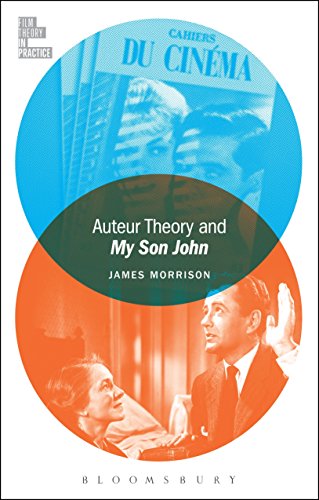Auteur Theory and My Son John (Film Theory in Practice)
James Morrison
BOOK REVIEW

In the realm of cinematic exploration, Auteur Theory and My Son John emerges not merely as a book, but as a compelling manifesto that challenges our understanding of authorship in film. James Morrison, with his incisive intellect, invites readers deep into the heart of film theory, crafting a narrative that intertwines the allure of auteurism with the poignant reflections of the 1952 film My Son John. This is more than academic theory; it's a passionate exploration of creativity, identity, and the intricate dance between a filmmaker's vision and the audience's perception. 🎬
What grips you from the very first page is the audacity with which Morrison tackles the daunting complexities of auteur theory-the notion that a director's personal style and creative vision can render them akin to an author of a literary work. As you delve into this profound analysis, you're prompted to confront the very essence of what it means to create art. Is the director merely a puppeteer of actors and script, or the visionary architect crafting a world that reflects their innermost thoughts? Morrison's exploration becomes a mirror, reflecting not just the mechanics of film, but also the relentless human struggle for expression. 💔
Each chapter pulsates with the heartbeat of film history, evoking emotions that resonate far beyond the confines of cinematic critique. Morrison navigates through decades of film, invoking the likes of Truffaut, Godard, and Hitchcock, while simultaneously grounding his theories in the experience of My Son John. This film, often dismissed in broader discussions, transforms into a poignant lens through which the reader can examine the fractured relationships between family, duty, and identity-elements that are fiercely relevant in today's society. 🌍
But don't be fooled; this is not just a historical recounting or a dry analysis. The work crackles with the energy of passionate debate. Readers find themselves caught in the crossfire of critical opinions-some laud Morrison's audacity to draw parallels between auteur theory and the film's deeply personal narrative, while others argue that his interpretations may stretch the bounds of cinematic loyalty. What's undeniable is that there's a fervor ignited within these pages, compelling you to reconsider your own preconceived notions of film and authorship. 🔥
A particularly chilling aspect of My Son John unfolds in its exploration of a mother's despair over her son's betrayal. Morrison, with poignant clarity, weaves this emotional core into the larger framework of auteurism, compelling readers to reflect: Does a film not encapsulate the spirit of its creator, much like a child embodies the essence of their parent? This question lingers, haunting the reader long after the final page is turned.
In a world increasingly dominated by digital production and commoditized content, Morrison's work serves as a clarion call to the significance of individual authorship. Why does this matter? Because as society becomes desensitized to the multiple layers of artistic expression, we are at risk of losing the very soul of storytelling-the ability to connect, to provoke, and to inspire deep, visceral responses. Morrison's nuances remind you, every creator has a voice, and every film a heartbeat worthy of exploration. 🎥
However, Morrison's interpretations haven't evaded scrutiny. Critics argue he occasionally gets lost in abstraction, sacrificing narrative clarity for theoretical bravado. Yet, perhaps that's what makes this work so tantalizing-it dares to provoke, to challenge, and to ignite passionate discussions. Isn't that the hallmark of truly great art?
With Auteur Theory and My Son John, you're not merely reading a book; you're engaging in a vibrant conversation on creativity and chaos, bound by the threads of family dynamics and artistic responsibility. This isn't merely a tome for film scholars; it's a visceral experience that connects you to the fundamental questions of your own life's narrative. The transformation of thought it inspires stays with you, urging one to dive deeper, to question louder, and to feel more intensely.
As you close this profound exploration, one thing becomes undeniably clear-Morrison's compendium is a significant contribution to the realm of film theory, ensuring that the discourse around authorship will not just survive, but thrive. So, let the discussions commence! How do you perceive the auteur? Are they a genius or simply a custodian of collateral? The next movie night just got a lot more interesting. ✨️
📖 Auteur Theory and My Son John (Film Theory in Practice)
✍ by James Morrison
🧾 200 pages
2018
#auteur #theory #john #film #theory #practice #james #morrison #JamesMorrison